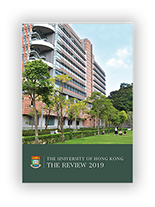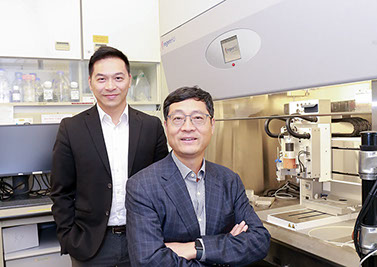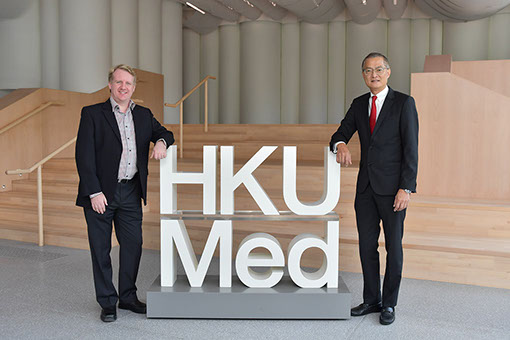Research and Innovation
2018_%20.png?crc=3873734352)
PDF Version
Past Issues
Vision and Mission
An Extract from
the University’s
Annual Accounts 2018–19
The University Profile
Officers of the University
The Court
Teaching and Learning
Research and Innovation
Knowledge Exchange and
Technology Transfer
Message from the
President and
Vice-Chancellor
E-Book

Attracting Support
For years, our researchers have had great success in competitive funding exercises and 2019 was no exception. We performed strongly in both Hong Kong-based schemes and those from Mainland China.
National Key R&D Recipients

Professor William Lu Weijia (right) and Dr Kelvin Yeung Wai-kwok (left) from the Department of Orthopaedics and Traumatology.
Scholars from Hong Kong and Macau are now allowed to apply directly to the National Key R&D Program of the Ministry of Science and Technology (MOST) for funds that will be used for research conducted here. This scheme offers substantial funding for key and strategic research technologies. Two rounds of applicants were awarded during the year and HKU scientists were winners in both rounds.
Organ reconstruction using 3D printing is the focus of Professor William Lu Weijia, Ng Chun-Man Professor in Orthopaedic Bioengineering in the Department of Orthopaedics and Traumatology, who was the first scientist in Hong Kong and Macau to be awarded under the MOST scheme outright. He and his team have invented high precision 3D bio-printing technology and new ‘bio-inks‘, and they received RMB27.44 million to apply their technology to rebuilding complex tissue structures according to their natural physiological tissue microenvironment.
“Tissue damage and organ failure caused by ageing, disease and accidents may potentially lead to increased morbidity and mortality in patients. Although recent advances in tissue engineering and biomaterials have regenerated injured tissues and organs, the clinical outcome, especially for the functional recovery, has not been satisfactory due to the complexity of human tissues. We propose to address that clinical challenge by focusing on the tissue microenvironment,” Professor Lu said.
He is leading a multidisciplinary team from five institutions in Mainland China and Hong Kong, as well as an industrial partner. They will fabricate functional 3D bio-printed scaffolds for tissue and organ regeneration and aim to print 12 different tissues and organs, such as full-thickness skin, cornea, bone, cartilage and large blood vessels, to test in pre-clinical animal models. Positive results will mean they can proceed to clinical trials and ultimately benefit hundreds of thousands of patients each year.
Developing new alloys is the focus of a project that awarded RMB11.07 million in the second round of the MOST scheme open for Hong Kong and Macau to Professor Huang Mingxin of the Department of Mechanical Engineering. Professor Huang has both industrial and academic experience in working with metal and alloys, and he will lead his team in developing new nanostructured high entropy alloys that have the potential for application in extremely low temperatures or in nuclear power plants.
“We have always been actively looking for funding opportunities beyond Hong Kong. When we saw this call for proposals, we felt that our research expertise fitted very well with the programme. Through this project, we want to demonstrate that HKU’s expertise can make important contributions to national R&D projects,” Professor Huang said.
His team includes researchers from HKU, the Chinese Academy of Sciences, Dalian University of Technology and Xi’an Jiaotong University, covering expertise in such areas as metallurgy, mechanics, nuclear technology and ab-initio calculation.
TRS Scholars Offer Paths to Better Health
HKU professors from the Li Ka Shing Faculty of Medicine are leading two of the five Theme-based Research Scheme (TRS) projects awarded in 2019, while other HKU scholars are members of two other projects.
Control of influenza is the focus of a $50 million TRS project coordinated by Professor Benjamin Cowling in the School of Public Health. The project will build on HKU’s world-leading influenza research programme to address important questions about influenza virus immunity and transmission.
Professor Cowling and his multidisciplinary, multi-institutional team will be identifying signs that an individual has protection against influenza infection or severe disease and looking at which of these are induced by prior natural infection or vaccination. They will also consider the factors that make populations more susceptible to influenza, how to best deploy new and existing influenza vaccines to reduce the impact of epidemics and pandemics, and other immunological mechanisms that are relevant to the development and evaluation of new influenza vaccines.

Professor Huang Mingxin from the Department of Mechanical Engineering.
“Our overall aim is to improve options for the control of pandemic and seasonal influenza through a greater scientific understanding of the mechanisms underlying individual and population immunity. This includes complementary research on virology, immunology, epidemiology, and vaccinology,” he said. “It’s really important that we have these large collaborative thematic research projects because by working together, we can have much greater potential impact through the synergy between our disciplines.”
Liver tissue repair, particularly after transplantation, is the focus of a $45 million TRS project by Professor Lo Chung-mau. The prevalence of hepatitis B virus (HBV) infection and liver cancer incidence and the shortage of deceased organ donors is a great burden on individuals and the healthcare system.
Professor Lo, who is Chair of Hepatobiliary Surgery, Chin Lan-Hong Professor in Hepatobiliary and Pancreatic Surgery, and Chief Executive of the University of Hong Kong-Shenzhen Hospital, will be building on HKU’s world-leading expertise in liver transplantation, particularly living donor liver transplants using a graft of the right liver lobe. He and his team will focus on the persistent problems of recurrent disease and liver graft injury post-transplantation by exploring the underlying mechanisms of cancer recurrence and HBV reactivation, identifying biomarkers and developing potential treatments.

Professor Benjamin Cowling (left) from the School of Public Health and Professor Lo Chung-mau (right) from the Department of Surgery.
They also hope to promote liver tissue repair and regeneration, which would help get around the problem of a shortage of organ donors. Professor Lo and his team will be working with a biobank of about 50,000 tissue and liquid biopsies from patients. “Using this biobank, we will establish a system that integrates high-throughput sequencing data and biology and immunology parameters that will enable us to predict disease recurrence and prognoses and offer therapeutic guidance,” he said. New drug targets and therapeutic strategies are expected to result.